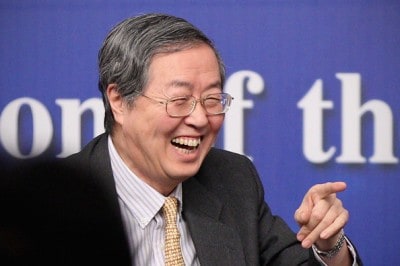
PBOC Governor Zhou Xiaochuan is doing his best to prop up the economy without further inflating the bubble.
In the latest in a round of easing measures to support its slowing economy, China’s central bank is said to be planning to inject RMB 200 billion ($32.6 billion) in funding into the banking system.
The move made known by the People’s Bank of China (PBOC) late last week would supply the funds to about 20 of the country’s national and regional joint stock banks after a number of earlier fiscal and monetary moves have so far failed to stop a slide in the country’s housing market or halt the overall slowdown in economic growth.
More Lending to Bolster China’s Economic Growth
According to an account in the Wall Street Journal, the funding support to the joint stock banks, which include a second tier of lending organizations beyond the country’s big five state-owned institutions, comes fast after a move last mont that put RMB 500 billion into those financial giants. The credit supplements are intended to boost bank balance sheets and encourage more lending to rekindle economic growth.
Earlier this month the China Academy of Social Sciences (CASS) adjusted its prediction for China’s 2014 economic growth from 7.4 percent down to 7.3 percent, citing among other causes the decline of the country’s real estate market. The downgrade by CASS was the second one this year after the influential government think tank earlier abandoned its prediction of 7.5 percent GDP growth.
According to sources familiar with the matter, the PBOC has asked the eligible banks to submit applications for the new funds to the central bank.
China Stops Short of Broad Stimulus
This newest round of lending support comes as the latest of China’s economic mini-measure, while the government attempts to avoid the kind of broad-based stimulus that might further inflate the country’s asset bubble and drive more over-investment.
While a year-long decline in the real estate market is seen as one of the primary causes of the economic slump, the government has taken care to only gradually offer support to the industry to avoid encouraging further froth.
Starting in April this year the authorities in Beijing started letting local governments tinker with or even roll back controls on housing, and since then the government has restored support for mortgage discounts and tried to encourage banks to lend.
In July the government even brought back mortgage-backed securities, which had earlier been banned after the US subprime crisis, to try to make more credit available for home purchases.
The adjustments in bank credit and real estate policies come as the government attempts to wean the country off of its dependence on investment-driven growth into a more consumption-driven economic model.
Leave a Reply